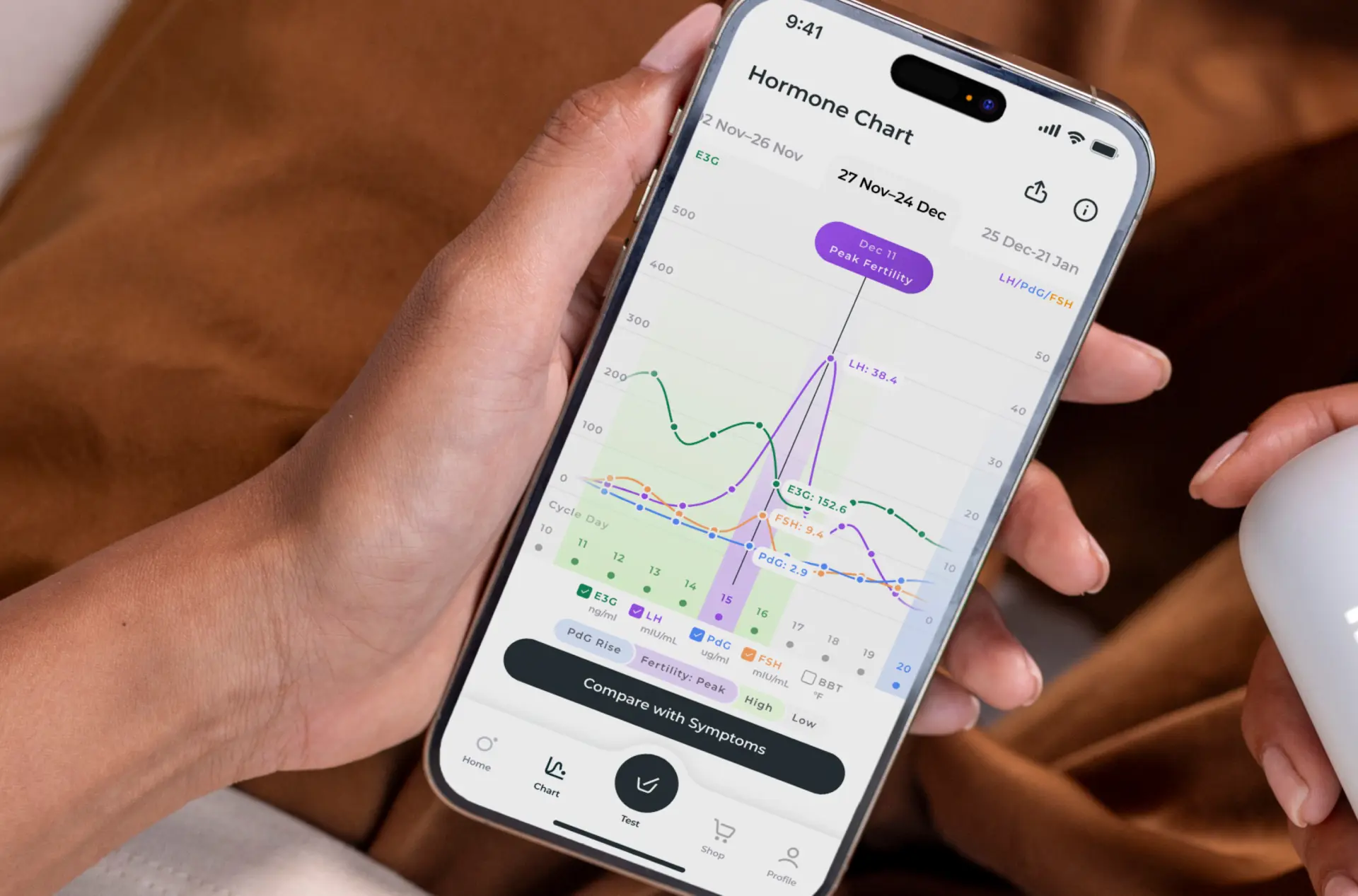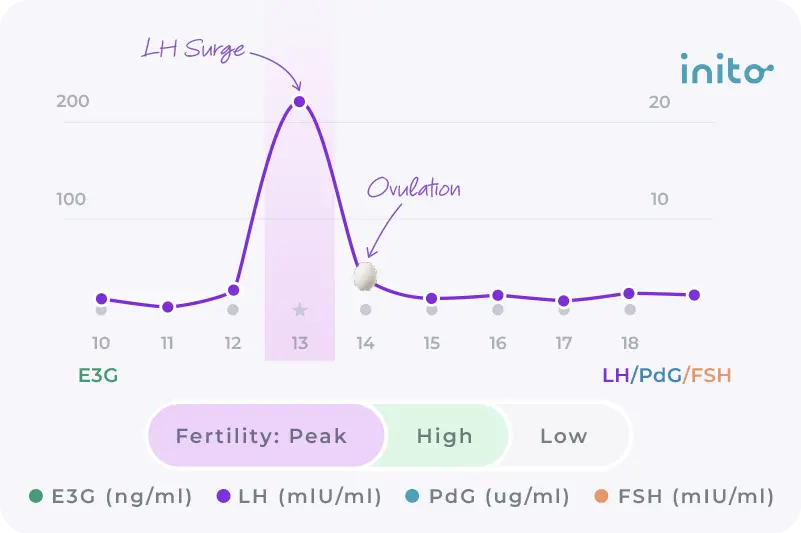Content table
Are you thinking about using letrozole for fertility?
Letrozole is a fertility medication that works to induce ovulation. It is particularly useful in women with PCOS and certain cases of unexplained infertility. In fact, studies have found that 61.7 % of women with anovulation due to PCOS ovulated while on letrozole and 27.5% went on to have a live birth.
This means letrozole could give you a greater chance of conceiving if you’re struggling with anovulation.
In this article, we will cover the who, what, when, where, and why of letrozole.
Let’s begin by digging into how letrozole works.
Note: We use the names letrozole and Femara® interchangeably throughout this blog. They are the same medication but Femara® is the brand name and letrozole is the drug name.
What is letrozole (Femara®), and how does it work?
Letrozole (Femara®) belongs to a group of medications called aromatase inhibitors.
Femara® was introduced as an alternative to the fertility medication Clomid® in the nineties. Clomid®, while effective for ovulation induction, presented with antiestrogenic effects on the endometrium and cervical mucus. Additionally, many individuals experienced perimenopausal symptoms such as night sweats and hot flashes while taking Clomid®.
Learn more: 10 Tips for Getting Pregnant on Clomid®
Letrozole showed promise but unfortunately, its use was discontinued in 2005 due to reports of birth defects. However, these reports were proven false – larger and better-designed studies have shown that letrozole is a safe fertility medication that is just as or even more effective than clomiphene in inducing ovulation.
How exactly does letrozole work for fertility?
The TL;DR is that it blocks estrogen production, which causes your body to produce FSH, which then causes your follicle to grow a mature egg. This is why letrozole is called an ovulation induction medication.
But here’s what happens on the molecular level if you want to nerd out on science for a second.
Aromatase is an enzyme created by your body that converts androgens into estrogens. Letrozole is an aromatase inhibitor which means it inhibits the effects of aromatase.
This effectively blocks the production of estrogen.
When your brain senses that estrogen levels are low, it kick-starts the process of follicle stimulating hormone (FSH) production. This is because FSH stimulates your ovarian follicles to grow, indirectly resulting in a rise in estrogen. As the follicles grow, so do your eggs
Which is a win for fertility!
The hope is that at least one of the eggs will mature enough and be released during ovulation to get fertilized by sperm.
So how do you know if you should consider letrozole for fertility?
How does letrozole help improve fertility?
Letrozole can be a great option for many women. It is primarily used as a fertility treatment for the following cases:
- Chronic anovulation where the person does not ovulate at all and experiences irregular or even no periods.
- Polycystic ovary syndrome (PCOS) which is a hormonal condition in which the ovaries produce an abnormally high amount of androgens. It results in anovulation, period irregularities, and fertility issues.
- Certain cases of unexplained infertility where the cause for infertility is unknown.
- Patients not responding to or resistant to clomiphene citrate.
- Patients unable to bear the side effects of Clomid® such as mood swings, hot flashes, and nausea.
Letrozole does not increase your chances of pregnancy if you have non-ovulatory issues like the following:
- Hypogonadotropic hypogonadism where there is a problem with the hypothalamus or the pituitary gland. As a result, the signaling system between the brain and the ovaries is “broken”, causing little or no hormones to be produced.
- Infertility factors unrelated to ovulation like blocked tubes, uterine abnormalities, or pelvic lesions.
As always, consult your doctor about whether or not letrozole is right for you.
When do you ovulate after taking letrozole?
The dosage for letrozole can vary (usually 2.5-7.5 mg) and is often started on day 3 of your cycle, which is during menstruation. You continue taking letrozole for 5 days, and then you’re expected to ovulate 5-10 days after your last dose.
From here, you’ll need to pinpoint when you’re going to ovulate. Ovulation usually occurs between cycle days 14-19 depending on when you start your regimen.
You can use an OPK (ovulation predictor kit) or ovulation test to pinpoint when you’re ovulating.
Start testing after the last day of taking letrozole and keep testing until you get a positive result. A positive OPK indicates your LH levels are on the rise and ovulation will occur in the next 24-36 hours.
However, while ovulation tests can help track LH, they don’t provide the full picture of your fertility hormones. And while they predict ovulation, they can’t confirm it.
Your doctor may also order a follicular scan to monitor the growth of the follicles or ask for Day 21 blood progesterone levels to check if you have actually ovulated or not. However, day 21 progesterone testing can be inaccurate if you don’t have 28-day cycles.
This is where Inito comes in.
Inito measures four fertility hormones – LH, estrogen, and FSH help you track your fertile window and tell you when you’re going to ovulate, and PdG (a urine metabolite of progesterone) helps confirm ovulation, all on a single test strip.
Moreover, you get actual numerical values on easy-to-understand charts, which removes all the uncertainty and guesswork while trying to get pregnant!
When to have sex after taking letrozole?
Have sex 2-3 days after the last dose of Femara® and have sex every alternative day.
For example, if you started taking letrozole on CD 3, you will take it for 5 days until CD 7. You can start having sex at CD 8 or 9. Try to have sex every other day ideally until CD 18.
It is helpful to use ovulation tests or Inito during this time to predict when you’re going to ovulate.
Learn more: When to Have Sex When You Are Trying to Get Pregnant?
How successful is letrozole?
The success of letrozole will depend on your underlying condition contributing to infertility.
If you have PCOS
Letrozole is often the first line of treatment if you have PCOS and anovulatory infertility.
Letrozole will help stimulate your eggs to grow and mature, increasing the chance of ovulation.
In one meta-analysis (which included around 4,000 women), letrozole had the following effects:
- Increased ovulation rate
- Increased rate of pregnancy
- Increased live-birth rates
Another study showed women with PCOS had greater success with letrozole compared to clomiphene citrate. The study found the following:
- Letrozole improved the rate of ovulation more effectively than clomiphene citrate (61.7% vs. 48.3%, respectively)
- Letrozole had a higher rate of live births compared to clomiphene citrate (27.5% vs. 19.1%, respectively)
For unexplained infertility
In unexplained infertility, you have difficulty getting pregnant but there is not an identifiable underlying cause.
In these cases, letrozole may be just as effective as other options such as clomiphene.
Here are some of the findings comparing letrozole to other fertility treatments:
|
Study |
Objective |
Findings |
|
Study 1 |
Compare the effectiveness of letrozole to clomiphene and gonadotropins in helping women with unexplained infertility get pregnant. |
Clomiphene and letrozole produced similar rates in pregnancy. |
|
Compare the effectiveness of letrozole to clomiphene plus estradiol in helping women with unexplained infertility get pregnant. |
Combining clomiphene and estradiol produced similar rates of pregnancy as letrozole. |
|
|
Compare the effectiveness of an extended letrozole regimen with clomiphene for women with unexplained infertility undergoing superovulation and intrauterine insemination (IUI). |
The extended letrozole regimen showed an increased pregnancy rate compared to clomiphene. |
|
|
Compare the effectiveness of letrozole to clomiphene in helping women with unexplained infertility get pregnant. |
No major difference in clinical pregnancy or live births between letrozole and clomiphene. |
Learn more: Clomid® vs. Letrozole: A Complete Comparison
How long does it take to get pregnant on letrozole?
This will vary from person to person. One study showed the average time to get pregnant for the 27.5% of women on letrozole was 90 days (or 3 cycles).
What are the side effects of letrozole?
As with all medicine, there are pros and cons. The biggest con with letrozole is the associated side effects.
Some of the reported side effects of letrozole are as follows:
- Nausea
- Vomiting
- Tiredness
- Headache
- Muscle aches
- Joint pain
- Hot flushes
- Hair thinning
- Vaginal dryness
Another common concern about letrozole is whether it increases the chance of twins or triplets. However, letrozole has a lower rate of twins or triplets than clomiphene.
This may be due to the short half-life of letrozole. During a letrozole cycle, the dominant follicle grows and secretes high levels of estrogen.
At a certain point, letrozole will not be able to block all of the estrogen produced. This causes less FSH to get produced which results in small follicles to stop developing.
However, in a Clomid® cycle, FSH is not suppressed by rising estrogen levels. This is because of the longer half-life of Clomid®. The constant high levels of FSH can cause multiple follicles to mature and get released during ovulation, which can result in twins or triplets!
Another concern about letrozole is the risk of congenital malformations.
However, multiple studies have shown there is no significant increase in congenital malformations in babies born to women who used letrozole.
Key Takeaways:
- Letrozole belongs to a class of medications called aromatase inhibitors. These medications lower estrogen levels in the body by inhibiting the enzyme aromatase. This causes FSH levels to rise which stimulates the growth of a mature egg.
- If you have anovulation, PCOS, unexplained fertility, or cannot take/tolerate Clomid®, letrozole may be a good option for you.
- Letrozole is often the first line of treatment if you have PCOS.
- Letrozole can be used for unexplained fertility and is equally as effective as clomiphene.
- The cost of letrozole can vary based on many factors. However, it is still cheaper than gonadotropins or IVF.

FAQs
The success rate of letrozole can depend on many factors. Letrozole is found to be particularly helpful for women with PCOS. Letrozole will not be successful for all cases of infertility since the mechanism of action focuses on ovulation induction.
One study demonstrated a 61.7% success rate with ovulation induction and a 27.5% success rate for live births.
Letrozole is an ovulation-inducing medication. It does this by blocking estrogen production in the body which causes the body to produce FSH. FSH stimulates the follicles in your ovary to grow a mature egg.
As with any medication, there are pros and cons. Letrozole is equally or even more effective than clomiphene for ovulation induction. It is also associated with lesser side effects and a shorter half-life than clomiphene. Side effects of letrozole include fatigue, dizziness, headaches, anxiety, and abdominal pains and cramps.
Letrozole could increase your chances of becoming pregnant by inducing ovulation. However, this will depend on underlying factors. Letrozole is not helpful for certain causes of infertility such as blocked tubes, uterine abnormalities, pelvic lesions, or hypogonadotropic hypogonadism.
The length of time it takes to get pregnant on letrozole varies from person to person. And there’s also no guarantee that taking letrozole will lead to successful conception. But one study found that among the participants who took letrozole, the average time to pregnancy was 3 cycles.
One study found that letrozole had a 61.7% success rate in inducing ovulation. And in that same study, taking letrozole resulted in a 27.5% success rate for live births.
Yes, taking letrozole can slightly increase your chance of ovulating more than one egg. In one study, 3.9% of the women who took letrozole gave birth to twins, which is slightly higher than the natural birth rate of twins. That said, the chance of superovulation (ovulating more than one egg) while taking letrozole isn’t quite as high as it is compared to taking Clomid®.
Your doctor will give you guidance on your exact dosing. But typically fertility specialists prescribe somewhere between 2.5 to 7.5 mg of letrozole. They may begin you on a lower dose in the first cycle and then up the dose as needed in subsequent cycles.
Was this article helpful?
-
- Structural and functional characterization of aromatase, estrogen receptor, and their genes in endocrine-responsive and –resistant breast cancer cells.
- Letrozole Compared With Clomiphene Citrate for Unexplained Infertility
- Extended letrozole regimen versus clomiphene citrate for superovulation in patients with unexplained infertility undergoing intrauterine insemination: A randomized controlled trial | Reproductive Biology and Endocrinology
- Use of Letrozole versus clomiphene-estradiol for treating infertile women with unexplained infertility not responding well to clomiphene alone, comparative study – ScienceDirect
- Letrozole or clomiphene citrate as first line for anovulatory infertility: a debate | Reproductive Biology and Endocrinology
- Letrozole versus Clomiphene for Infertility in the Polycystic Ovary Syndrome
- Letrozole Compared With Clomiphene Citrate for Polycystic Ovarian Syndrome
- Clomiphene Citrate versus Letrozole for Ovulation Induction in PCOS: A Comparative Study
- Congenital Malformations among Babies Born Following Letrozole or Clomiphene for Infertility Treatment | PLOS ONE
- Lower multiple pregnancy rates with letrozole versus clomiphene in 16,001 IUI cycles over 10 years












